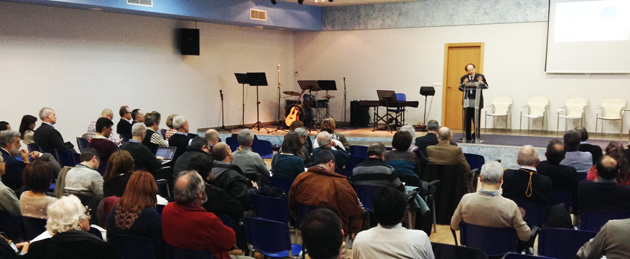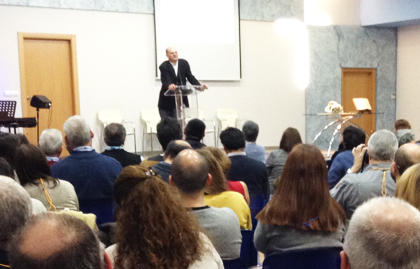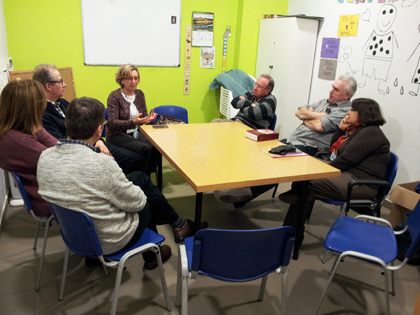“A solid evangelical identity is able to listen and contend for the faith”
“Preaching a Christ with no power leads to a church with no message”, concluded the Spanish Evangelical Alliance at their annual meeting. Evangelical identity and ecumenism were the main topics under discussion.
Protestante Digital · VALENCIA · 06 MARCH 2015 · 10:15 CET

The annual meeting of the Spanish Evangelical Alliance (AEE in Spanish) took place in Valencia last February. Around 120 people actively participated in 2 days of reflection, debates, workshops touching on current affairs, votings and conferences, organized under the name “Idea 2015”.
EVANGELICAL IDENTITY: THE BIBLE AND THE CROSS
Author and international speaker Dr Pablo Martínez opened the event with a talk about the “essence and experience” of the evangelical faith, a faith that must “walk along the main road of Christianity”.
Martínez stated that being Christian implies to understand that the Bible and the Cross are “indispensable” and “untouchable”, because Jesus himself laid them as foundations. Moving away from them brings a dangerous lack of humility in our approach to God and His Word.
Theological Liberalism became a problem when Europe wanted to challenge “the Scriptures´ authority”, explained Martínez. “A Word without authority leads to a faith without miracles. A faith without miracles leads to a powerless Christ. A powerless Christ leads to a church without a message, and a church without a message ends up being a human and humanistic gospel”, stated the speaker. Because of that, it is worthy “to contend for the faith”, as the apostle Paul said.
Martínez emphasized that “a personal relationship with Christ has consequences beyond us”, the faith must be alive. There is a balance (sometimes tense, but necessary) between “being thirsty for God and keeping an eye on the world, a balance between transformation and mission”, he said.
This mission must always join teaching (gospel preaching) and action. And with all this, a clear evangelical identity will give the Holy Spirit the place it deserves. If the Evangelicals “are solid in their foundation, they will be able to be flexible in their life experience”, concluded Martínez, regarding the plurality among the different evangelical denominations.
ECUMENISM: EVANGELICALS AND CATHOLICS RELATIONS
The next session was “Ecumenism and our relationship with the new Catholicism“. The speaker was José de Segovia, the president of the AEE´s Theology Commission.
Segovia began admitting that “there is not an agreement among Evangelicals about Catholicism”.

The pastor and theologian assumed that the majority of Evangelicals in Spain understand the need of “distinguishing between the Catholic institution and the Catholic people” and that it is always good to talk and listen to those who have different opinions.
However, Segovia stated that ecumenical movements like “Evangelicals and Catholics together” in the USA “are disoriented, because are based on personal experiences, and not on the Catholicism’s institutional reality, or its doctrine”.
“Having things in common with the Catholics means that we are closer to them doctrinally speaking?” asked Segovia. “No”, he answered, and then explained two reasons why the differences are insurmountable.
On one hand, there is the soteriological problem: what is salvation? While Catholics are not sure about it, Evangelicals “know for sure we are saved by Grace”, an assurance that is usually seen as arrogant by Catholics, Segovia explained.
And the other huge difference between Catholics and Evangelicals, according to the speaker, is the sacramentalism, by which the Catholic Church “does not distinguish between Jesus and the Church, so that the latter ends up assuming an authority that belongs to Christ”, taking for granted someone’s faith just because he is baptized.
“If we are going to proclaim the Gospel, we have to do it to religious and non religious people, as Jesus did”, he concluded.
OPEN GROUPS AND WORKSHOPS
The general assembly of the Spanish Evangelical Alliance took place at the end of Satirday's morning. Different networks (Bioethics, Politics, Family, Social action, Youth, Media, Prayer...) informed about their progress and several decisions were voted, including a change in the internal structure which will grant full voting rights to all members of the Spanish Evangelical Alliance (almost 1,000 people).
Right after lunch, there was a time for open discussion in groups about new initiatives.

The meeting finished with three practical workshops for the attendees to choose: “Discipleship today”, “Resources for accompanying people at the end of their lives”, and “Creating a political thinking from a biblical perspective”.
Published in: Evangelical Focus - europe - “A solid evangelical identity is able to listen and contend for the faith”
